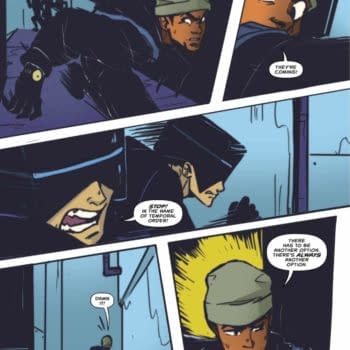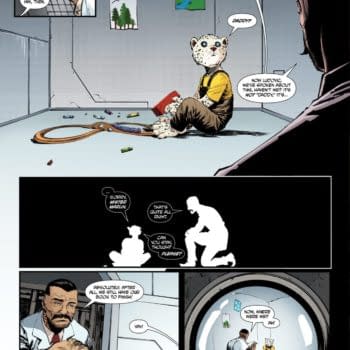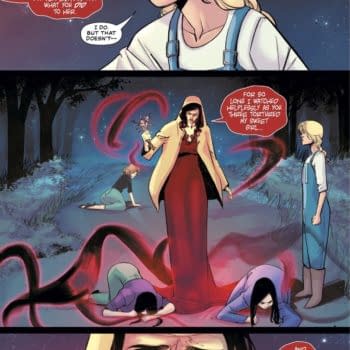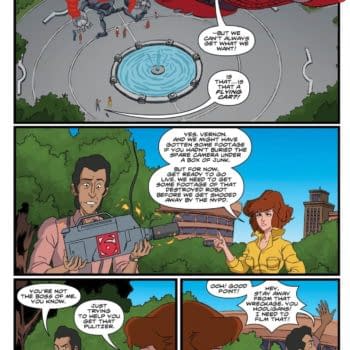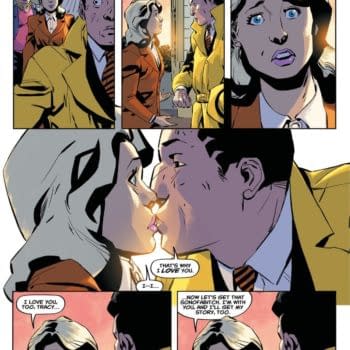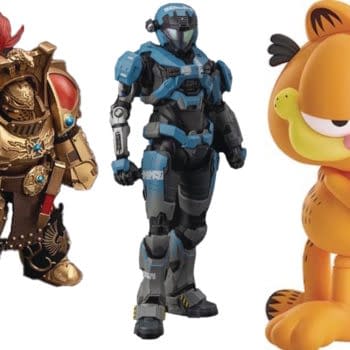Posted in: Comics, Recent Updates | Tagged: Dave Kelly, Gender In Comics, Hazel Newlevent, Hullabaloo Books, Lara Antal, Marguerite Dabaie, Molly Ostertag, Robin Ha, So What? Press
One Of The Most Intelligent Panels On Gender In Comics Featuring Lara Antal, Marguerite Dabaie, Robin Ha, Hazel Newlevent, Molly Ostertag – With Complete Audio



Here is a selection of quotes from the evening's panel, but for a full experience of this boundary-pushing talk, we have an audio recording of our nearly two hour event also.
[youtube]http://www.youtube.com/watch?v=LT1AFibdkAI[/youtube]
On Stereotypes:
Hazel Newlevent: I think it's really cool to upset the general stereotype that people have that history's been proceeding from most oppressive to most egalitarian or this idea that if you're setting something in history that it has to be really sexist. I think it's great to explore periods where gender roles were really different and sometimes for the better.It upsets the idea that things are traditional throughout history and it must be that way.
Lara Antal: There are certain expectations and you can break them. And for my preference, how to do that without having to take out your bullhorn and scream at them. How do you do it in subtlety and how do you do it to add to your story is an interesting issue or challenge–a good challenge.
Hannah Means-Shannon: It sounds like what we're talking about is that the visual language of comics has been established and is a bit stuck. When people read, they are identifying these archetypes, like we're saying, but they are reading a short form, so some readers are going to misidentify what they are seeing. If you all are forward thinking enough to start pushing that language, it seems like establishing a new language is what creators have to do if they want to have more freedom with those archetypes.
[Work by Hazel Newlevent]
On Costuming:
Robin Ha: The costumes need to change in superhero comics. It's clearly for men. What kind of woman would want to wear that to a battle? It's not realistic at all. Right now there's such a huge movement in fashion in general where people on MTV look like superheroes. They have crazy costumes that don't always have to be sexualized, but they can still be exciting to look at.
Marguerite Dabaie: Have them be kickass in their respective place and time. You want strong characters to be incidental, and costumes are a way of doing that. Through costume you can make it clear that this character might be a little bit of a rebel. There are ways to indirectly get your point across. In my historical fiction, part of the reason why I chose Central Asia in the 7th century as a place and time is because gender does play a role in the comic but I find it extremely dynamic and interesting. They wore really bright, colorful clothing, but the differences between men and women's clothing really wasn't that much.
[Work by Marguerite Dabaie]
On the Internet Age:
Molly Ostertag: I think the internet is by and large an incredible tool for building a comics career, but in a wider sense it's incredible because you can directly read things and see things that give you a window onto the lives of people that you would never meet in life. And I think it's an incredible tool for creating empathy. Everyone's on the internet and so you can find communities of people interested in what you're creating guaranteed. If there's not, they will form around your work. For making new gender roles and making new archetypes, there are already people there who are hungry for it and want it. And it's not happening as much in mainstream media, but it's happening in a big way online. And I think people know that.
Marguerite Dabaie: The gate keepers are kind of crumbling. The internet has crumbled the idea. I know so many people who just build up their fan base completely on Tumblr and are able to get published through that. They go to comic con and have fans coming over. It's phenomenal. It really is totally exciting. The thing that we need to figure out now is how to make money off of it. I really think that's the problem. Even if not to make a living, at least feel like it's financially worth your time.
[Work by Molly Ostertag]
On Genre Comics:
Molly Ostertag: Personally, I find genre comics, things with a fantastical element whether it be superpowers or magic or science fiction technology, I find them to be really potent ways to address social issues without having to specify exactly. To make it universal by talking about it in this metaphorical way. I think you can really do a lot of good by positive social examples and positive role models, stories that draw in people because they have dragons and magic and lasers, but then there's also a diversity of characters and positive role models. I see that more and more. There are people who love Lord of the Rings but they wish there was a single woman in there. And so they are taking the assets that they love but not betraying their social consciousness.
On The Future:
Robin Ha: There are a lot of general barriers between mediums. If everyone treats comics just like books or movies as an entertainment form, there are just as many people going to movies, men and women, and reading any kind of books, men and women, so in a perfect world that I want to live in, people would treat comics just like anything else, any other medium.
Lara Antal: One thing I'd like to see more are sexual characters. Because you can have a woman who wants to be sexy, but it's hard. I don't know that I've seen a lot of good examples. The thing that I'm thinking of right now is Tank Girl. She's sexual, and I enjoy that they want to portray that character and I don't think they are demeaning to her. I think she's strong in so many ways. To have fun with it, that's cool. I think sometimes people are a little afraid to touch that subject. Because it could backfire. If you're having too strong of a female character sometimes, what's going to happen when you have one who wants to drink and have sex? There are a million criticisms there.
Hazel Newlevent: I agree definitely with putting your money behind what you want to see and I think that also, even if you can't do that, there are so many ways to contact creators right now. Just telling people that you like what they're doing and that their work is meaningful to you—sometimes that's going to make people want to make more stuff.
[Work by Lara Antal]
[Hannah Means-Shannon, Lara Antal, Dave Kelly, Robin Ha, Marguerite Dabaie, Hazel Newlevent, Molly Ostertag]
Hannah Means-Shannon is Senior New York Correspondent at Bleeding Cool, writes and blogs about comics for TRIP CITY and Sequart.org, and is currently working on books about Neil Gaiman and Alan Moore for Sequart. She is @hannahmenzies on Twitter and hannahmenziesblog on WordPress. Find her bio here.
















